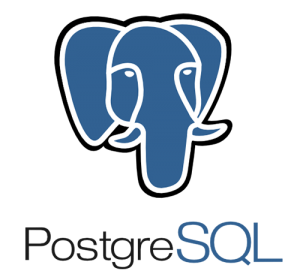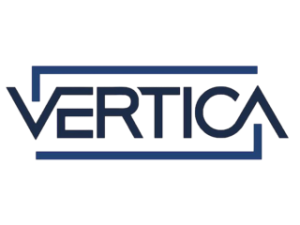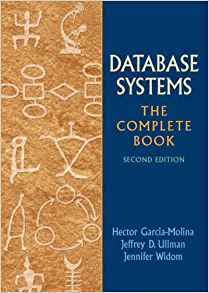Fall 2017
Welcome to Database Management Systems!
All the homework/labs/lectures will be distributed on Moodle.
We meet TR, 2:45-4 pm, AEC 500.
Course Description
This course examines the organization, design and implementation of database management systems. Together, we will examine how important database systems are to our everyday activities, how they contribute to society, and how they enrich the emerging field of data science. You will learn to design and build database applications, and leave the class with the skill needed to improve your understanding and use of databases on a continuing basis.
| Types of Databases We Will Study |
|
| Relational Databases and Online Transaction Processing | |
 |
O
|
| No SQL Databases | |
 |
N
|
| Column Stores for Online Analytical Processing | |
 |
O
|
Instructor
Instructor Information(back up↑)
- Instructor: Dr. Joann J. Ordille
- Email: ordillej at lafaytte.edu
- Office: 522 AEC
- Office Phone: (610) 330-5416
- Office Hours: T 1-2pm. W 11 am – 12 pm. F 1:30pm-3:30pm. Please email me if you would like to meet at any other time. Also, if my door is open, feel free to drop in.
Resources
Useful Links(back up↑)
Gradiance is our online learning system. Gradiance provides exercises with guidance when you choose an incorrect answer. Create your account using the code I emailed you.
After reading some introductory text, this course will present an SQL feature and give you exercises to test your understanding. As with any language, computer or natural, practice is key to internalizing the language. lynda.com (see below) also provides SQL tutorials.
- lynda.com
lynda.com is available from your my Lafayette page. It provides many helpful tutorials. I recommend the “Ruby on Rails 5 Essential Training” and the “D3.js Essential Training for Data Scientists.” You can use lynda to help fill in background you might need for your project. You may also find courses there on Ruby and Bootstrap helpful.
- Papers published in the computer science literature as announced on Moodle.
We will read two or more papers together to broaden our perspective on databases. Reading computer science papers is a primary way to keep up with the state of the art once you graduate. You will learn approaches to reading a computer science paper that will increase your understanding of it.
- Moodle
We will use Moodle extensively. In particular, detailed information for class activities and assignments will be available weekly. Please check Moodle frequently, and whenever you receive an email notification to do so.
Course Information(back up↑)
- Web Page:http://sites.lafayette.edu/ordillej/cs-320-database-management-systems-syllabus-fall-2017/
- Textbooks:
-

- Database Systems: the Complete Book, 2nd ed. by Hector Garcia-Molina, Jeffrey D. Ullman and Jennifer D. Widom. (ISBN: 978-0-13-187325-4), Pearson.
This book is on reserve in the library. Before purchasing the Kindle version of this book, please note that the Kindle license is limited to ONE device.
-
- Prerequisites:
Students are required to complete CS 205 (Software Engineering) successfully before registering for this course. Software engineering techniques will be used in your database design and development project. Students are also required to co-register in CS 202 (Analysis of Algorithms). Algorithms studied in CS 202 are used in database systems, and the efficiency of various database algorithms will be discussed in this course.
Course Goals and Outcomes(back up↑)
Course Goals:
The goals of this course are to convey:
- Understanding of important database design principles with a focus on efficiency and extensibility.
- Functional understanding of the Structured Query Language (SQL) for the creation and manipulation of databases.
- Skill in developing a database management system starting from a set of requirements.
- Experience in developing a substantial database design, constructed as a group working over the majority of the semester.
- Effectiveness in reading and evaluating papers in computer science.
Course Outcomes: After successfully completing this course, students will be able to:
- Apply knowledge of computing and mathematics appropriate to database systems and to the computer science discipline.
- Design, implement, and evaluate a database system to meet desired needs.
- Function effectively on a team to accomplish a common goal.
- Engage in continuing professional development in database systems and the computer science discipline.
(back up↑)Assignment Types
Class Attendance: Class attendance is critical to success. In addition to instruction, we will engage in a variety of software engineering practices, e.g. the scrum of scrums, to assist in the design and development of the group projects. Every effort should be made to arrive on time and remain attentive for the entire class. In addition to unexcused absence, a pattern of late arrival, early departure or inattentiveness will be considered a violation of the attendance requirement. For every unexcused absence, you will lose 0.5 points from your final grade up to a total of 3 points. If you have a dean’s excuse or a coach’s letter for a particular day, you will be excused from class.
Class Participation: Class participation includes asking or answering questions, expressing an opinion about a topic of discussion, meeting with me during office hours, and reporting on activities in a group project, a reading group, or other group activity. All sincere efforts to participate are admired, so don’t worry, just speak up. You are even welcome to express an opinion different than mine. All types of participation count except participation that shows you failed to prepare for class. For example, asking: “Who is Ada Lovelace?” when the assignment was to read the Countess of Lovelace’s biography would not count as class participation.
Reading Groups: Before the second class meeting, we will form reading groups of four to five students. Two or more times during the semester, you will read a paper in the computer science literature, and meet with your reading group to discuss it. I will provide you with a strategy for reading the paper well, and some questions for discussion. Your group will be responsible for submitting a summary of your discussion in writing before the class meets to discuss the paper with me. You may also want to meet with your reading group to study for exams. Your software project group may be different from your reading group.
Quizzes: To help you stay current, there will be unannounced quizzes. The quiz will test your knowledge of the previous week. The intention here is to encourage you to review the material each week in preparation for the next week.
Homework: Homework assignments will consist of problems and labs in the Gradiance System, and other problems/labs assigned in class. Assignments will be listed in Moodle to help all of us track them. Completing the homework will deepen your understanding and assist you in preparing for exams. Your homework should be your own work, and not copied or supplied by anyone else. Since we will often discuss homework in class after the due date, late homework will not be accepted. For each Gradiance homework, you can read the assistance and redo the exercise if you make a mistake. I will record the maximum of your attempts at each exercise on the Gradiance system.
Group Projects: As advanced students in computer science, you are now in a position to accept and evaluate software project requirements from a client. This semester we are fortunate to have the Lehigh Valley Research Consortium (LVRC), a division of the Lehigh Valley Association of Independent Colleges (LVAIC), as a client. Tentatively, there will be two group projects in our class. The first will focus on visualizing an existing database of K-12 performance for Pennsylvania Schools for the LVRC website. The second will focus on creating a new database and database application for it for the LVRC.
Extra Credit: An optional activity for our class is to collect Internet resources that inspire us in the study of databases. Post your recommendations on Moodle for up to 3 points of extra credit in your final grade. The best will be showcased in class.
Exams: In addition to the ability to answer homework type problems, questions on the midterm and final exams will also test your conceptual understanding of database systems. We will discuss the types of possible exam questions before each exam. You will be allowed one sheet of paper with notes to assist you in taking the exam. All work on the exam must be your own. There will be no make-up or early exam sittings without a request from the Dean on your behalf.
(back up↑)Academic Honesty
It is essential that you follow the Lafayette College Code of Conduct with respect to academic honesty and avoidance of plagiarism as described in the Student Handbook. The beginning of the semester is a good time to review the handbook in this regard.
“To maintain the scholarly standards of the College and, equally important, the personal ethical standards of our students, it is essential that written assignments be a student’s own work, just as is expected in examinations and class participation. A student who commits academic dishonesty is subject to a range of penalties, including suspension or expulsion. Finally, the underlying principle is one of intellectual honesty. If a person is to have self-respect and the respect of others, all work must be his/her own.”
The Handbook gives the following examples of intellectual dishonesty:
- Submitting someone else’s work as your own.
- Incorporating someone else’s ideas or work into your own without attribution.
- Paying or arranging for someone else to do your work.
- Re-using material from another course without permission of your instructor.
- Engaging in unauthorized collaboration including asking for homework or programming assignment answers from an online discussion group.
- Obtaining the Instructor’s Answer Guide to the exercises in the book and using it. (This would also constitute theft, since the guide is only licensed to instructors.)
When in doubt about whether an action is considered academic dishonesty, it is best to consult with me before you act. Cases of suspected intellectual dishonesty will be reported to the Dean, and the Dean will investigate and impose penalties.
(back up↑)Grading
Graded Material:
The course grade is based on the materials listed below graded on a 100 point scale, with each item contributing a specified percentage to the overall score. As specified in the student handbook, A will reflect excellent work, B will reflect good work, C will reflect acceptable work, and D will reflect passing work.
| Class Attendance | 3% |
| Class Participation | 3% |
| Quizzes | 3% |
| Homework | 10% |
| Group Projects | 30% |
| Mid-Term | 25% |
| Final Exam | 26% |
Grading Scale:
Typically, grades are assigned as follows from your final numerical grade:
| A: 93-100 | B+: 87-89 | C+: 77-79 | D+: 67-69 | F: 0-59 |
| A-: 90-92 | B: 83-86 | C: 73-76 | D: 63-66 | |
| B-: 80-82 | C-: 70-72 | D-: 60-62 |
(back up↑)Tentative Schedule*
| Wk. | Dy. | Date | Topic |
Readings (T:Textbook)
|
|
|---|---|---|---|---|---|
| 1 | T | 8/29 |
Introduction to Databases
|
T: 1
|
|
| R | 8/31 |
The Relational Model
|
T: 2
|
||
| 2 | T | 9/5 |
Ted Codd’s Paper,
Functional Dependencies
|
Ted Codd’s Paper, T: 3
|
|
| R | 9/7 |
Functional Dependencies
|
T: 3
|
||
| 3 | T | 9/12 |
Project 1 Discussion,
SQL Programming Environments
|
T: 9
|
|
| R | 9/14 |
SQL Programming Environments
|
T: 9
|
||
| 4 | T | 9/19 |
Algebraic and Logical Query Languages
|
T: 5
|
|
| R | 9/21 |
SQL Programming
|
T: 6
|
||
| 5 | T | 9/26 |
SQL Programming
|
T: 6
|
|
| R | 9/28 |
SQL Programming
|
T:6
|
||
| 6 | T | 10/3 |
MongoDB,
NoSQL Databases
|
TBD
|
|
| R | 10/5 |
Lab
|
|||
| 7 | T | 10/10 |
Fall Break. No Class.
|
|
|
| R | 10/12 |
Exam Review,
Schema Design
|
T: 3
|
||
| 8 | T | 10/17 |
Midterm Exam
|
||
| R | 10/19 |
Project 1 Presentations
|
T: 3
|
||
| 9 | T | 10/24 |
Project 2 Discussion,
Schema Design
|
T: 3
|
|
| R | 10/26 |
Database Design
|
T: 4
|
||
| 10 | T | 10/31 |
Database Design
|
T: 4
|
|
| R | 11/2 |
OLAP, OLTP, NoSQL
Physical and Logical Layers
|
TBD
|
||
| 11 | T | 11/7 |
SQLite, a shining light
in Software Engineering
|
Richard Hipp’s Talk
|
|
| R | 11/9 |
Constraints and Triggers
|
T: 7
|
||
| 12 | T | 11/14 |
Views and Indices
|
T: 8
|
|
| R | 11/16 |
Views and Indices
|
T: 8
|
||
| 13 | T | 11/21 |
Transactions:
Are they needed?
Are they ignored?
|
TBD
|
|
| R | 11/23 |
Happy Thanksgiving! No class.
|
|||
| 14 | T | 11/28 |
Special Topic TBD
|
TBD
|
|
| R | 11/30 |
Special Topic TBD
|
TBD
|
||
| 15 | T | 12/5 |
Review
|
|
|
| R | 12/7 |
Project 2 Presentations
|
|||
| TBD | FINAL EXAM** |
*Tentative schedule, subject to change. Check Moodle for the most up to date information.
**No travel arrangements should be made until the final exam schedule has been issued
(back up↑)Additional Information
Respect for classmates, colleagues and team members: All students are expected to show respect and courtesy to each other. Mutual respect is a high ideal in academic, business, and personal life. It is central to learning well together. Disagreements over ideas or constructive criticism of someone’s work is in keeping with this ideal. Attacking or disparaging someone is not, and will not be tolerated. In group projects, mutual respect also includes reliably contributing to the project and keeping your commitments to the group.
We follow the College Diversity Statement which says in part:
All members of the College community share a responsibility for creating, maintaining, and developing a learning environment in which difference is valued, equity is sought, and inclusiveness is practiced.
To learn more about how these principles are followed in the computing industry, view the Google video:
Diversity at Google (https://youtu.be/_3RoQRN65AI)
and the eBay video:
Diversity Workshop at eBay, Europe (https://player.vimeo.com/video/159767606)
Privacy: Moodle contains student information that is protected by the Family Educational Right to Privacy Act (FERPA). Disclosure to unauthorized parties violates federal privacy laws. Courses using Moodle will make student information visible to other students in this class. Please remember that this information is protected by these federal privacy laws and must not be shared with anyone outside the class. Questions can be referred to the Registrar’s Office.
Equal Access: In compliance with Lafayette College policy and equal access laws, I am available to discuss appropriate academic accommodations that you may require as a student with a disability. Requests for academic accommodations need to be made during the first two weeks of the semester, except for unusual circumstances, so arrangements can be made. Students must register with the Office of the Dean of the College for disability verification and for determination of reasonable academic accommodations.
Important Dates:
- Normal Add/Drop deadline: September 8th
- Last day to Withdraw (WD): November 14th
- Classes end: December 8th
- Final Exams: December 12th – 18th
Federal credit hour statement: The student work in this course is in full compliance with the federal definition of a four [two or one as appropriate for half and quarter unit courses] credit hour course. Please see the Registrars Office Website (http://registrar.lafayette.edu/additional-resources/cep-course-proposal/) for the full policy and practice statement.
Credits: Logos Copyright © PostgreSQL, mongoDB, Vertica respectively. Photo of Database Systems: The Complete Book Textbook Copyright © Pearson.
